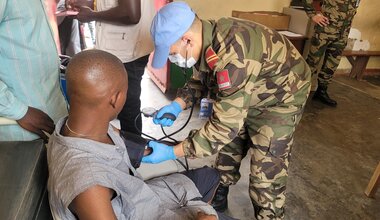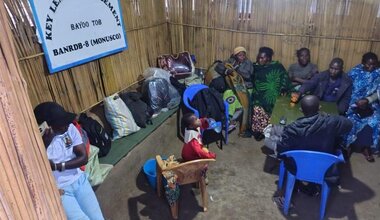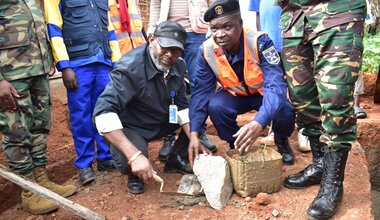Visitor's Lounge for Makala Inmates
Kinshasa, 26 May 2011 – As a prelude to the celebration of Peacekeepers' Day this year, the United Nations Stabilization Mission in the Democratic of Congo (MONUSCO) inaugurated a visitor's hall at the Makala central prison in Kinshasa. The $23,682 hall was constructed with funds from MONUSCO's Quick Impact Projects (QIP).
The hall will serve as a meeting area where inmates and visitors will be able to interact more easily. The QIP's funds were made available to MONUSCO's Correction Unit to support the country's Ministry of Justice and Human Rights.
Makala prison currently hosts more than 5000 inmates and it is the largest detention facility in Kinshasa.
The inauguration of the visitor's hall was part of the overall Peacekeepers' Day celebration this year, which is observed around the theme "Rule of Law". Prior to this project, MONUSCO also rehabilitated the sanitation facilities of the prison at the cost of $24,908.
The ceremony was attended by several high-ranking Government officials, among whom was Justice Minister, Mr. Luzolo Bambi Lessa. The Deputy-Special Representative of the UN Secretary-General in the DRC Ms Leila Zerrougui, led the UN delegation. A number of NGO partners were also present.
Justice Minister, Mr. Bambi Lessa said in his speech: "A person who is arrested and jailed is also a human being whose fundamental rights must be guaranteed". He thanked MONUSCO for building this visiting hall, which will help maintain family ties with the inmates. "This may appear insignificant for those not in jails, but for inmates, it is a significant act, as it will serve as a bridge between them and their respective families and friends".
Ms. Zerrougui, who oversees Rule of Law activities within MONUSCO said "the construction of a visiting hall in the prison, as well as the rehabilitation of its sanitation infrastructure are basic human rights, insofar as they are instrumental in upholding two core penitentiary principles, namely creating more social and humane conditions for inmates, and giving them access to decent and basic sanitation facilities."
Maimouna Traoré/ MONUSCO
 UN
UN United Nations Peacekeeping
United Nations Peacekeeping






